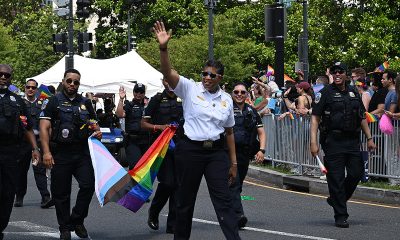Local
D.C. prepares for primary
Election outcome not likely to change Council support on LGBT issues

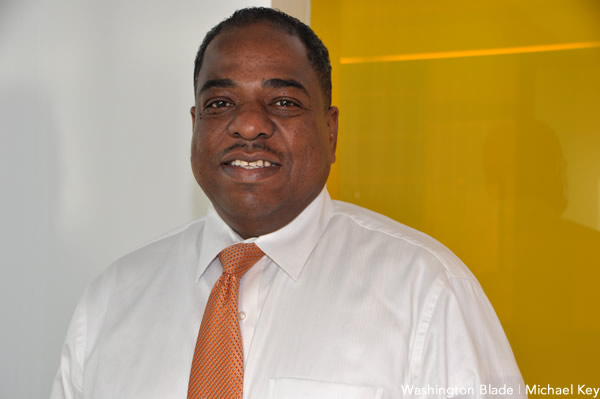
Political observers say Democratic opponents with the backing of LGBT activists have a shot at unseating Council member Vincent Orange in next week’s primary. Orange once opposed marriage equality but later changed his mind. (Washington Blade photo by Michael Key)
The District’s influential LGBT vote was expected to be divided on April 3 in the hotly contested race for an at-large D.C. Council seat held by Democratic incumbent Vincent Orange.
Orange and four of his Council colleagues — Jack Evans (D-Ward 2), Muriel Bowser (D-Ward 4), Yvette Alexander (D-Ward 7) and Marion Barry (D-Ward 8) — are running for re-election in the Democratic Party primary. Evans, a longtime supporter of LGBT rights, is running unopposed.
Similar to nearly all past elections, the winner in the primary is expected to win the general election in November in a city where registered Democrats far outnumber Republicans.
But unlike most D.C. primaries in recent years, where almost all incumbents win, political observers say Democratic opponents with the backing of LGBT activists have a shot at unseating Orange and Alexander.
And the president of the gay GOP group Log Cabin Republicans of D.C., Robert Turner, says gay Republicans are joining their moderate to progressive fellow party activists to wage a spirited challenge for at least three Council seats in the November election.
Based on the candidates running, most LGBT activist leaders say they don’t expect the election outcome in the April primary or November general election to change the D.C. Council’s overall longstanding support for LGBT equality.
“I do not see any changes that will impact the LGBT community,” said gay Democratic activist Peter Rosenstein. “We are a strong community with the support of the majority of the Council today and that will continue,” he said.
Alexander and Barry were the only two Council members that voted against the city’s same-sex marriage law when it passed in the Council by a vote of 11-2 in 2009. Both have been supportive on most other LGBT issues in the past.
However, the Gay & Lesbian Activists Alliance this year assigned Alexander and Barry a -3.5 rating on LGBT-related issues in a rating system with -10 as the lowest possible score and +10 the highest. (A full listing of GLAA’s ratings of all D.C. Council candidates and the candidates’ responses to GLAA’s questionnaire on LGBT-related issues can be viewed at glaa.org.)
The Gertrude Stein Democratic Club, the city’s largest LGBT political group, has endorsed both Alexander and Barry in past elections. This year the club endorsed Ward 7 challenger Tom Brown over Alexander. The club didn’t make an endorsement in the Ward 8 race after none of five Democratic candidates running were able to obtain a 60 percent vote from club members to secure an endorsement.
The club also endorsed Bowser in the Ward 4 race, who’s favored to emerge as the winner over five Democratic challengers. Bowser, who voted for the same-sex marriage bill, received a +6.5 rating from GLAA.
Orange wasn’t on the Council at the time of the same-sex marriage vote. He came out against same-sex marriage when he ran unsuccessfully for mayor in 2006 but said he changed his mind on the issue a short time later. He says he now strongly supports the city’s marriage equality law and points to his past support on a wide range of other LGBT-related issues during his tenure as a Ward 5 Council member from 1999 to 2007.
GLAA, which assigned Orange a rating of +0.5, says Orange lost points for backing a number of initiatives opposed by GLAA, including a bill to make permanent certain locations in the city designated as “prostitution free zones.” Many of the city’s gay activists have joined transgender rights leaders and civil liberties advocates in calling for repeal of the law that created temporary prostitution free zones, saying it has been used to target and “profile” transgender women for police harassment on grounds that they appear to be engaging in prostitution by merely standing in certain parts of the city designated as prostitution free zones.
Orange said he no longer supports the bill to make the zones permanent. The bill calling for making them permanent was introduced by Alexander.
He is being challenged by former D.C. school board member Sekou Biddle, who was appointed to the at-large Council seat for less than a year in 2011, before losing it to Orange in an April 2011 special election. The seat became vacant in January 2011 after Council member Kwame Brown, who held the seat, won election to the post of Council chairman. Biddle received a GLAA rating of +5.5.
Also competing for the seat in the April 3 Democratic primary are Peter Shapiro, a former Prince George’s County Council member who recently moved to D.C., who also received a +5.5 GLAA rating, and E. Gail Anderson Holness, a Ward 1 Democratic activist and pastor of D.C.’s Christ Our Redeemer AME Church, who received a -1.5 GLAA rating.
Biddle and Shapiro have expressed strong support on LGBT issues. Both have lined up support in the LGBT community, with the largest number of prominent LGBT activists backing Biddle. Holness, who has called for a voter referendum on the city’s same-sex marriage law, failed to obtain a single vote at a Stein Club endorsement meeting earlier this month.
Biddle finished ahead of Orange in the Stein endorsement vote but fell five points short of the 60 percent needed for an endorsement. Gay supporters of Orange and Shapiro said support for their respective candidates prevented Biddle from winning the club’s endorsement, saying the development indicates Biddle’s support in the LGBT community may be declining.
They note that the Stein Club endorsed Biddle over Orange in the April 2011 special election, in which Biddle finished in third place behind Republican Patrick Mara and Orange, who won the election.
Biddle supporter John Fanning, a longtime gay Democratic activist, said polling data shows that Biddle has emerged as Orange’s strongest challenger and has a shot at beating Orange if the opposition vote isn’t evenly divided between Biddle and Shapiro.
Biddle has been endorsed by gay D.C. Council member David Catania (I-At-Large), and former rival Mara, a pro-LGBT school board member from Ward 1 who campaigned for the city’s same-sex marriage bill when it was pending before the Council.
Stein Club President Lateefah Williams said she believes challenger Tom Brown has a reasonable chance of beating Alexander in the Ward 7 primary. But similar to the at-large race, Williams and others seeking to replace Alexander say Alexander is likely to win if what they believe is a majority of the electorate opposing Alexander is divided among several candidates. Brown received a GLAA rating of +3.5.
Five candidates in addition to Brown are running against Alexander in the primary, including Kevin Chavous Jr., son of former Ward 7 Council member Kevin Chavous Sr., who also received a +3.5 GLAA rating.
Also running unopposed in the primary is D.C. Congressional Delegate Eleanor Holmes Norton, who is considered to be among the strongest supporters of LGBT rights in the U.S. Congress; and shadow U.S. House candidate Nate Bennett-Fleming. Both received endorsements from the Stein Club. GLAA doesn’t issue ratings for federal offices.
The Stein Club didn’t make an endorsement in the race for the city’s shadow Senate seat, in which incumbent Michael D. Brown is being challenged in the Democratic primary by Pete Ross. Both have expressed support for LGBT rights.
Republican Mary Brooks Beatty is running unopposed in the April 3 D.C. Republican primary for the at-large Council seat. In the Statehood-Green Party primary, Ann Wilcox and G. Lee Aikin are also competing for the at-large Council seat. Brooks received a “0” GLAA rating for not returning the group’s questionnaire and not having a known record on LGBT issues. Wilcox received a +0.5 rating. GLAA said she, too, did not return the questionnaire but received a half point for her record of support as an attorney for the gay direct action group Get Equal.
In the Ward 7 Council race, longtime community and anti-crime activist Ron Moten, who has helped the former LGBT gang Check It convert into a youth organization promoting a fashion clothing line, is running for the Republican nomination. He is being challenged by GOP candidate Don Folden Sr. The Log Cabin Republicans of D.C. has endorsed Moten and Brooks. Moten received a +1.5 GLAA rating.
Maryland
Silver Spring holds annual Pride In The Plaza
‘Today means inclusion. It means to build resilience’

Silver Spring’s annual Pride in the Plaza event took place on Sunday to celebrate the LGBTQ community and emphasize inclusion and resilience.
“Today means inclusion. It means to build resilience, love,” Robyn Woods, program and outreach director for Live In Your Truth, which organized the event, said. “I mean, just being surrounded by the community and so many great entrepreneurs, business owners, and just being a part of this whole rainbow coalition that we call the LGBTQIA to be about.”
With the event being her first time organizing for Live In Your Truth, Woods said she felt emotional to see the support and love at the event.
“Some people (are) bringing out their children, their babies, their grandparents,” Woods said. “It’s a lot more allies here than anything else. That type of support to me means so much more than just support from my community; just outside support, inside support, so much support around it, so much love. Everyone’s smiling outside, helping each other.”
Attendees of the event were able to head over to the Family Fun Zone, an air-conditioned Pride Cool Down Lounge, or watch live drag performances in the main stage area.
Along with entertainment and a shaved-ice stand, rows of information tables stood along the plaza, including FreeState Justice, the Washington Spirit, Trans Maryland, Moco Pride Center, and the Heartwood Program, an organization that offers support, therapy, education, and resources to the LGBTQ community.
“I want people to know about our services, and I love what we have to offer,” Jessica Simon, psychotherapist for Heartwood Program’s Gender Wellness Clinic, said. “I (also) want to be part of a celebration with the community, and so it feels good to be here with other people who have something they want to give to the community.”
She added that within today’s political climate, to which she called an “antidote to shame,” it’s important to be celebrating Pride.
“There’s a lot of demonization of LGBTQI people,” Siena Iacuvazzi, facilitator for Maryland Trans Unity, said. “(Pride) is part of the healing process.”
Iacuvazzi said she was taught to be ashamed of who she was growing up, but being a part of a community helped her flourish in the future.
“I was taught how to hate myself. I was taught that I was an abomination to God,” she said. “But being a community is like understanding that there are people who have experienced the same thing, and they’re flourishing. They’re flourishing because they’re willing to stand up for themselves as human beings and discover themselves and understand what’s true for themselves.”
She added that Pride allows for a mutual understanding to take place.
“It’s more of a sense of belonging … and just taking that home and understanding you’re not alone,” Iacuvazzi said. “We’re each taking our own journey — we’re not putting that on each other. It’s just walking away with a sense of belonging and humanity.”
Similar to Iacuvazzi, Woods said she hopes attendees’ biggest takeaways would be family, fun, resilience, and pride.
“Being proud of yourself, being happy for who you are, and representation and how much it matters,” she continued. “And I think all these young people that are walking around here get to see versions of themselves, but older. They get to see so many different lesbian, gay, bisexual, pansexual people that are successful, that are showing love, that care, and it’s not how we’re portrayed in the media. It’s lovely to see it out here. (It’s) like we’re one big old, happy family.”
Virginia
Spanberger touts equality, reproductive rights in Arlington
Democratic Va. gubernatorial nominee made campaign stop at Freddie’s Beach Bar
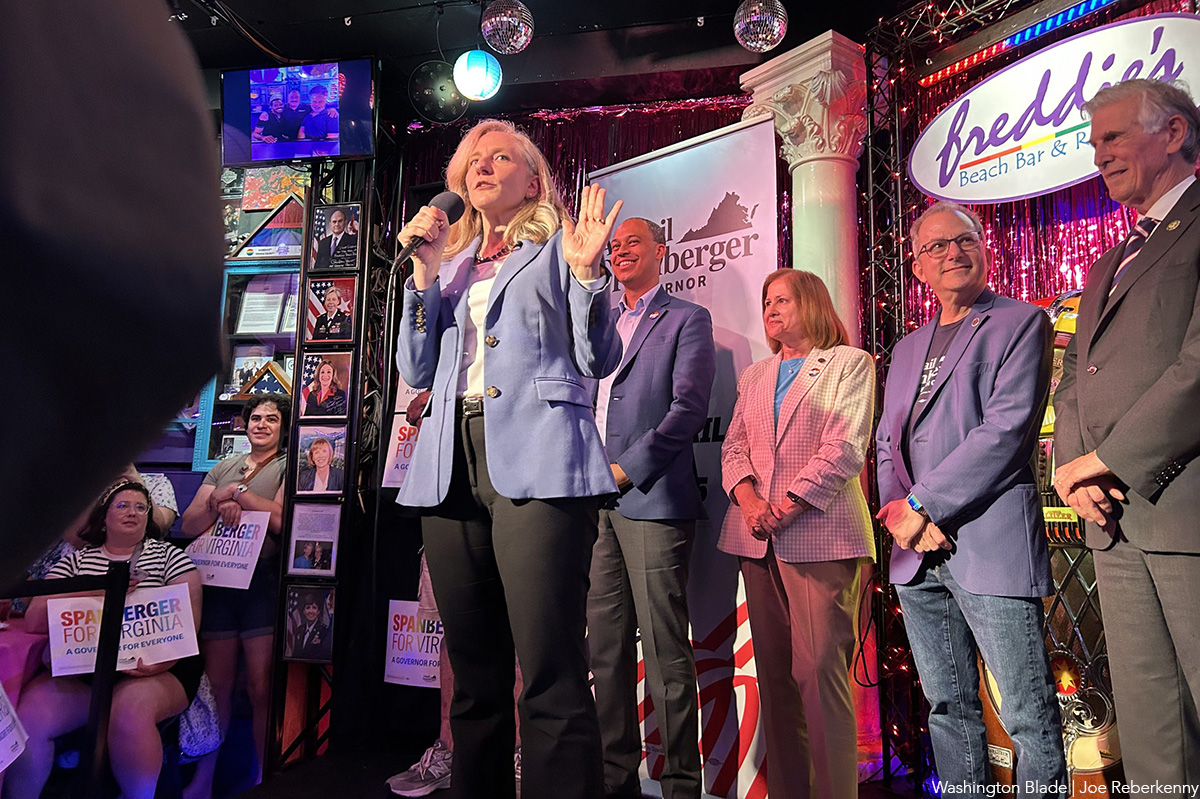
With the general election heating up and LGBTQ rights under increasing threat nationwide, Virginia gubernatorial candidate Abigail Spanberger brought her “Span Virginia Bus Tour” to Arlington’s Freddie’s Beach Bar for a campaign stop filled with cheers, policy pledges, and community spirit.
Spanberger, who served three terms in the U.S. House of Representatives from 2019 through early 2025 for Virginia’s 7th Congressional District, also served as a federal law enforcement officer specializing in narcotics and money laundering cases, and as a CIA case officer working on counterterrorism and nuclear counterproliferation.
Spanberger is running against Republican nominee Winsome Earle-Sears, the current lieutenant governor of Virginia, who said she was “morally opposed” to a bill protecting marriage equality in the commonwealth.
She was joined by other Democratic candidates and supporters: lieutenant gubernatorial candidate Ghazala Hashmi, attorney general candidate Jay Jones, Virginia state Sen. Adam Ebbin (D-Alexandria), and Congressman Don Beyer.
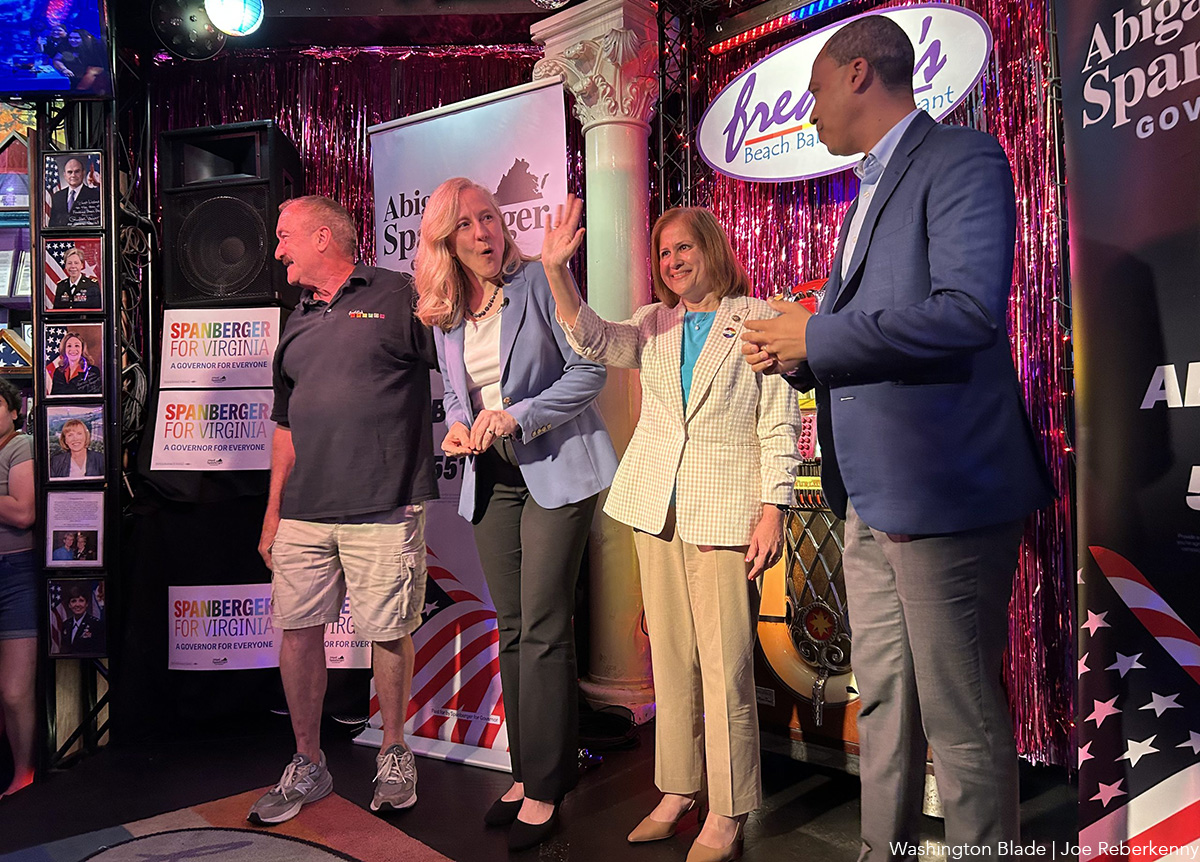
Freddie’s was packed wall-to-wall with supporters, many of whom wore “Spanberger for Virginia” shirts in the progressive Pride flag colors. In her speech, she made it clear that LGBTQ Virginians’ rights are on the ballot this year.
“I’m so excited to be here, and I am so grateful to the entire staff of Freddy’s for letting us overtake this incredible venue that is not just an awesome place to come together in community, but is a symbol to so many people of joy, of happiness, of community and of celebrating our friends and our neighbors,” Spanberger told the packed restaurant. “It is exciting to be here, and particularly during this Pride month, and particularly as we reflect on the 10-year anniversary of Obergefell and the reality that we still have so much work to do.”
“The reality is there are so many people who still would be inclined to take us backwards,” she said. “In this moment when we see attacks on people’s rights, on people’s humanity, on Virginia, on our economy, on research, on public education, on food security, on health care, on Virginians, on their jobs, on public service and on people — it can get heavy.”
“What it does for me is it makes me want to double down, because once upon a time, when I was talking to my mother about some horror show or sequence of activities coming out of a particular administration, she did not really have the patience to listen to me and said ‘Abigail, let your rage fuel you’ — and the conversation was over. And so I reflect on that, because, in fact, every day there is so much fuel to be had in this world and in this moment.”
One of the points Spanberger continued to emphasize was the importance of steadfast state government officials following the election of President Donald Trump, which has led to rollbacks of LGBTQ and bodily autonomy rights as a result of the conservative-majority U.S. Supreme Court.
“What the past few years have shown us is that a Supreme Court decision, no matter how many years we have celebrated its existence, does not protect us in the long term. And so as governor, I will work to make sure that every protection we can put in place for the dignity, the value, and the equal rights of all Virginians is a priority.”
During her speech, Spanberger highlighted several of the key values driving her campaign — protecting reproductive freedom and human rights, lowering healthcare costs, safeguarding Virginia’s environment, and ensuring that public education is affordable, accessible, and rooted in truth, not politics.
Spanberger went as far as to say that she wants to amend the state’s constitution to remove Section 15-A. “The reality is that in Virginia, we still have a ban in our state constitution on marriage equality. It is of the utmost urgency that we move forward with our constitutional amendment.”
“We will work to ensure that that terrible constitutional amendment, that was put in years ago, is taken out and updated and ensuring that Virginia is reflective in our most essential documents of who we are as a commonwealth, which is an accepting place that celebrates the vibrancy of every single person and recognizes that all Virginians have a place, both in that constitution and in law,” she added.
Following the event, two supporters spoke to the Washington Blade about why they had come out to support Spanberger.
“I came out because I needed to show support for this ticket, because it has been a particularly rough week, but a long few years for our rights in this country, in this state, with this governor, and it’s — we need to flip it around, because queer people need protection,” said Samantha Perez, who lives in Ballston. “Trans people need protection. Trans kids need protection. And it’s not gonna happen with who’s in Richmond right now, and we just need to get it turned around.”
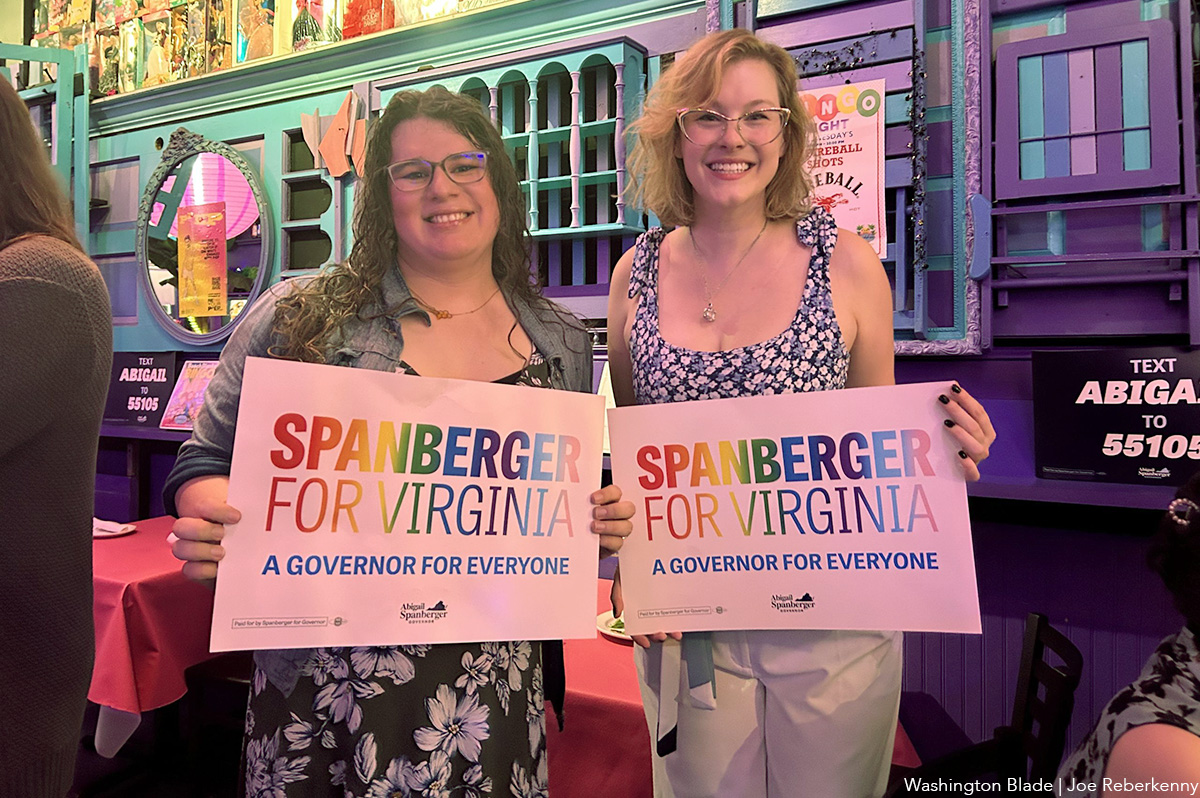
“The whole neighborhood’s here. All our friends are here,” said Annie Styles of Pentagon City. “It means the world to me to take care of each other. That’s what a good community does. That’s not what we’ve had with the Republicans here or across the nation for a really long time. It’s time to show that care. It’s time to make sure that good people are in a position to do good things.”
District of Columbia
Activists protest outside Hungarian Embassy in DC
Budapest Pride scheduled to take place Saturday, despite ban

More than two dozen activists gathered in front of the Hungarian Embassy in D.C. on Friday to protest the country’s ban on Budapest Pride and other LGBTQ-specific events.
Amnesty International USA Executive Director Paul O’Brien read a letter that Dávid Vig, executive director of Amnesty International Hungary, wrote.
“For 30 years Budapest Pride has been a celebration of hope, courage, and love,” said Vig in the letter that O’Brien read. “Each march through the streets of Budapest has been a powerful testament to the resilience of those who dare to demand equality, but a new law threatens to erase Pride and silence everyone who demands equal rights for LGBTI people.”
“The Hungarian government’s relentless campaign against LGBTI rights represents a worrying trend that can spread normalizing division and hatred,” added Vig. “Thank you for standing with us when we refuse to be intimidated.”
Council for Global Equality Chair Mark Bromley and two of his colleagues — Stephen Leonelli and Keifer Buckingham — also spoke. Health GAP Executive Director Asia Russell and Chloe Schwenke, a political appointee in the Obama-Biden administration who worked for the U.S. Agency for International Development, and Planned Parenthood staffers are among those who attended the protest.
(Washington Blade video by Michael K. Lavers)
Hungarian lawmakers in March passed a bill that bans Pride events and allow authorities to use facial recognition technology to identify those who participate in them. MPs in April amended the Hungarian constitution to ban public LGBTQ events.
Budapest Pride is scheduled to take place on Saturday, despite the ban. Hundreds of European lawmakers are expected to participate.
“Sending strength to the patriotic Hungarians marching tomorrow to advance human dignity and fundamental rights in a country they love,” said David Pressman, the gay former U.S. Ambassador to Hungary, on Friday on social media.
Sending strength to the patriotic Hungarians marching tomorrow to advance human dignity and fundamental rights in a country they love. Szabadság és szerelem. My past remarks on Budapest Pride: https://t.co/y1QhA9QouA
— David Pressman (@AmbPressman) June 27, 2025
-

 U.S. Supreme Court3 days ago
U.S. Supreme Court3 days agoSupreme Court upholds ACA rule that makes PrEP, other preventative care free
-

 U.S. Supreme Court3 days ago
U.S. Supreme Court3 days agoSupreme Court rules parents must have option to opt children out of LGBTQ-specific lessons
-

 India5 days ago
India5 days agoIndian court rules a transgender woman is a woman
-

 National4 days ago
National4 days agoEvan Wolfson on the 10-year legacy of marriage equality





